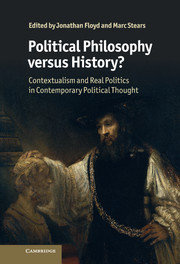 Political Philosophy versus History?
Political Philosophy versus History? Book contents
- Frontmatter
- Contents
- Note on the contributors
- Acknowledgements
- Introduction
- Part I The challenge of contextualism
- Part II The challenge of realism
- 5 Politics, political theory and its history
- 6 Constraint, freedom, and exemplar: history and theory without teleology
- 7 History and reality : idealist pathologies and ‘Harvard School’ remedies
- 8 The new realism : from modus vivendi to justice
- Relative value and assorted historical lessons : an afterword
- Index
- References
7 - History and reality : idealist pathologies and ‘Harvard School’ remedies
from Part II - The challenge of realism
Published online by Cambridge University Press: 05 June 2012
- Frontmatter
- Contents
- Note on the contributors
- Acknowledgements
- Introduction
- Part I The challenge of contextualism
- Part II The challenge of realism
- 5 Politics, political theory and its history
- 6 Constraint, freedom, and exemplar: history and theory without teleology
- 7 History and reality : idealist pathologies and ‘Harvard School’ remedies
- 8 The new realism : from modus vivendi to justice
- Relative value and assorted historical lessons : an afterword
- Index
- References
Summary
My topic in this chapter is realist or non-utopian political theory. My question is why this kind of political theory must depend, as its partisans often claim it must, on history. Realism can name many different positions. My focus here will be on the kind of realism produced by what I shall call the ‘Harvard School’. This is the kind of political theory cum political science that flourished at that university in the 1960s and 1970s and persisted, with decreasing prominence, through the 1990s. It was associated with such figures as Carl Friedrich, Samuel Huntington, Michael Walzer, Harvey Mansfield, Louis Hartz, Samuel Beer and Karl Deutsch (and more recently with thinkers educated at or influenced by Harvard, such as Jonathan Allen, John Dunn, Rogers Smith, Bernard Yack, Stephen Holmes, Frederick Whelan and, more equivocally, Nancy Rosenblum). It drew on a canon of liberal and non-liberal realists from Thucydides and Machiavelli through Montesquieu, Hume, the authors of the Federalist, Tocqueville (sometimes obsessively), and culminating in Weber; and bore a sneaking, reluctant admiration for Nietzsche.
- Type
- Chapter
- Information
- Political Philosophy versus History?Contextualism and Real Politics in Contemporary Political Thought, pp. 151 - 176Publisher: Cambridge University PressPrint publication year: 2011
References
- 14
- Cited by


